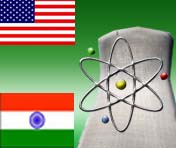US Congress waiting for India to move on nuke deal, says senior Democrat
 Washington, July 16 : A senior Democrat leader has said that he is somewhat disappointed over the pace at which the Indian Government is moving on the important, though controversial US-India civil nuclear cooperation deal.
Washington, July 16 : A senior Democrat leader has said that he is somewhat disappointed over the pace at which the Indian Government is moving on the important, though controversial US-India civil nuclear cooperation deal.
Representative Joseph Crowley, a Member of the House Committee on Foreign Affairs, said that it been almost two years since the U. S. House of Representatives had cleared the pact for onward discussion in the U. S. Senate, and now the U. S. Congress was waiting for India to “advance from their end the first part of the deal”.
“I don’t want to say I am terribly disappointed, but I am somewhat disappointed that it (the nuclear deal) did not move in a faster way in India,” said Crowley.
Representative Crowley said New Delhi still has a long way to go before it can ensure the operationalisation of the landmark deal.
“I think that there are still some mighty steps that need to taken, not only passing the legislation within the Indian parliament and being passed into law… They also have the IAEA standards and protocol that need to be established, and I understand that they are moving on that front now. And then, the nuclear supply group nations, the NSGs, 45 of which have to agree unanimously to allow for India to receive the shipment of fuel. So, there is a great deal that has to happen outside the realm of the U. S. Congress,” said Crowley.
As far as the role of the U. S. Congress was concerned, he seemed to express scepticism about the time on hand to facilitate the deal’s passage.
He said that at present the Congress had less than three months to consider the proposal, and he could not visualise a lame-duck session being specially called to have the deal passed, what with the presidential elections round the corner.
When asked whether Obama as president would support the deal, Crowley said that Obama had till now voted in favour of its passage.
“I think we can look back historically, he (Obama) has been supportive and I think that would speak well for the future,” Crowley said.
Questioned about the ongoing debate in Congress on the issue of proliferation of arms, Crowley said that there was no real debate going on right now about the US-India civilian nuclear transfer deal, as New Delhi is yet to take action.
The Congress, he said, is focussing on developments in Pakistan, nuclear power and clean energy, besides the price of gas and oil in the U. S, “much of which is being driven by competing demands within China and India”.
He further said that the significance of the US-India deal, was that both countries were on the lookout for cleaner forms of energy, and have accepted that civil nuclear energy is one option for them both.
The fact that India is not a proliferator beyond its borders, as were some other countries (read Pakistan), has weighed deeply with Washington, and therefore, it was considered feasible by both countries to consider such a deal.
The United States, he said, saw India as a critical partner, and therefore, the relationship between the two needed to be got “right for the next century.”
Crowley said that if the deal was not passed in the ensuing months, it should not be seen as a slap in the face of either the United States or India, because as far as Washington and the American people were concerned, this was not a very major issue right now.
He did not rule out the possibility of other countries moving in to sign similar pacts with India, but suggested that the US could not be ignored, as it is a major player and so was the 45-member Nuclear Suppliers Group, of which the US is a key member.
“It’s not about any one entity supplying India, it’s about all the countries working in good faith with India to do that,” Crowley said, adding should other countries step in to fill the breach created by the US, Washington could be prodded to stay engaged and to find a solution.
On whether the nuclear deal was being used to ensure a balance of power in Asia, Crowley said that he did not know too much about the balancing aspect, but what was of more importance to him was Washington’s keenness to have a significant and solid relationship with India.
On how the US-India nuclear deal fitted into the broader picture of US-India relations, Crowley said that in comparison to the past, there was now a level of cooperation being developed, a sense of trust that would be critical for the future of the two countries in this century.
“I think that’s what this deal basically reflects, the needs for balance, and the nurturing of a better relationship,” he said. (ANI)